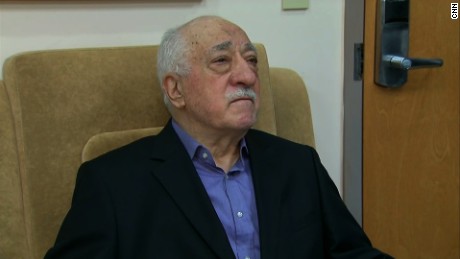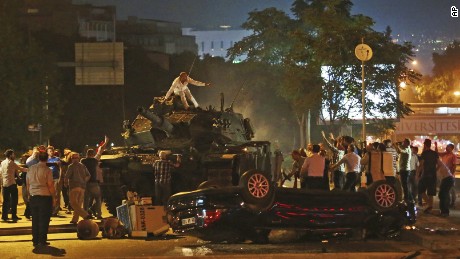Story highlights
- Turkish president says there are viruses in the military that must be cleansed
- 24 broadcasters have media licenses revoked
- Teachers, journalists, police and judges among those fired or suspended
Istanbul (CNN)Turkish President Recep Tayyip Erdogan announced the nation is imposing a three-month state of emergency in the aftermath of last week's bloody coup attempt.
Erdogan met Wednesday with his national security council and council of ministers, the latter of which approved the state of emergency recommendation.
"The purpose of the declaration of the state of emergency is, in fact, to be able to take the most efficient steps in order to remove this threat as soon as possible, which is a threat to democracy, to the rule of law and to the rights and freedoms of the citizens in our country," Erdogan said, according to a government translation.
Erdogan, speaking to a national television audience, said the state of emergency was not a threat to democracy. Governors will have expanded powers and the army will be under the command and control of the governors, the President said.
He guaranteed that all the "viruses" in the armed forces would be cleansed.
"It is very similar to a cancer," he said. "It is like a metastasis that is going on in the body that is Turkey. And we will clean it out."
The President praised the reactions to the coup attempt, in which 246 people died and 1,536 were wounded.
"Every member of our nation came together as one," he said.
Mass firings
Turkey has now fired or suspended about 50,000 people after a failed coup over the weekend as it intensifies its vast purge -- battering the country's security forces and many of its democratic institutions.
Teachers, journalists, police and judges alike have been caught in a net authorities are casting wider by the day, in what is increasingly looking like a witch-hunt to suppress dissent. In total, more than 9,400 people are being detained, the vast majority of them from the military.
Western leaders have urged Erdogan and his government to respect democratic principles and act within the law in response to talk of reviving the death penalty and heavy-handed punishments over the coup.
Who has been netted?
The purge has gutted the leadership in the country's security forces, with at least 118 generals and admirals detained, stripping the general-rank command of the Turkish military by a third, according to Turkish state broadcaster TRT.
Authorities have also suspended 8,777 Ministry of Interior personnel, mostly police, as well as 100 Turkish intelligence service personnel, according to the state-run Anadolu news agency.
Here's a tally of just some of the others who have been affected, according to Anadolu:
- 21,738 teachers in private institutions have had their licenses revoked;
- 2,745 judges and prosecutors have been listed for detention, although it is unclear if they have all been detained;
- 1,577 university deans have been asked to resign.
Anadolu reported that Turkey's top broadcasting authority on Tuesday revoked the licenses for 24 radio and television companies that it said are linked to Fethullah Gulen, whom Erdogan blames for masterminding the coup.
Turkey on Tuesday formally requested the extradition of Gulen from the United States, where he lives in self-imposed exile.
WikiLeaks shut down
The government has blocked WikiLeaks after the whistleblower website dumped almost 300,000 emails from Erdogan and his Justice and Development Party (AKP) on Tuesday evening.
Access was restricted because of a "violation of privacy and publication of illegally obtained data," a Turkish official told CNN.
The organization had reported late Monday night that it had come under a sustained cyberattack after announcing on social media its plan to leak hundreds of thousands of documents on "Turkish power."
On Wednesday, using the hashtag #TurkeyPurge, WikiLeaks confirmed Erdogan's government had ordered the site be blocked and offered users advice on proxies and IPs to use to access the site.
The most recent emails were sent on July 6 and the oldest dates back to 2010, WikiLeaks said.
'Crackdown of exceptional proportions'
Rights group Amnesty International said that authorities had canceled 34 journalists' press cards and called on Turkish authorities to not "arbitrarily restrict freedom of expression."
"We are witnessing a crackdown of exceptional proportions in Turkey at the moment," said Andrew Gardner, Amnesty International's Turkey researcher.
"Turkey's people are still reeling from the shocking events of the weekend and it is vital that press freedom and the unhindered circulation of information are protected, rather than stifled."
State broadcaster TRT lost 370 staff members who have been suspended, according to CNN Turk.
Hundreds more have been suspended from the Prime Minister's office and government bodies dealing with religious affairs, family and social policy and development. The total fired or suspended is around 50,000 people.
More than 9,000 people are currently in detention and are under investigation over the coup, according to Deputy Prime Minister Numan Kurtulmus.
Turkey's Council of Higher Education also demanded all universities suspend academic assignments abroad and that an investigation be launched into all staff linked to what it calls the "Fethullah Gulen Terrorist Organization," Anadolu reported.
Will Gulen be extradited?
U.S. President Barack Obama spoke with Erdogan on Tuesday about the coup and the status of Gulen, who lives in Pennsylvania.
Obama "strongly condemned" the coup attempt and "expressed his support for Turkish democracy," a White House news release said, without explaining whether Gulen would be extradited.
Under the U.S.-Turkey extradition agreement, Washington can only extradite a person if he or she has committed an "extraditable act." Treason -- such as that implied by Erdogan's demand for Gulen's extradition -- is not listed as such an act in the countries' treaty.
The Muslim cleric has denied any involvement in the coup attempt.
Gulen, in a statement released Tuesday, said Erdogan "once again demonstrated he will go to any length necessary to solidify his power and persecute his critics."
"It is ridiculous, irresponsible and false to suggest I had anything to do with the horrific failed coup. I urge the U.S. government to reject any effort to abuse the extradition process to carry out political vendettas," he said.
The reclusive cleric leads a popular movement called Hizmet, which includes hundreds of secular co-ed schools, free tutoring centers, hospitals and relief agencies credited with addressing Turkey's social problems.
Soldiers sent for president told target a 'terrorist'
Soldiers sent to apprehend Erdogan during the attempted coup were told they were to "capture an important terrorist leader," Anadolu reported.
The soldiers involved in the President's apprehension were informed of the details of the coup as they were being airlifted to a hotel in a resort town where Erdogan and his family were vacationing during Friday's deadly attempted takeover.
It is unclear how many soldiers participated in the attack, during which two of Erdogan's bodyguards were killed, and it is unclear how loyal the troops were, given that they were briefed on the coup so late in proceedings.
Meanwhile, Erdogan's military aide, Lt. Col. Erkan Kivrak, has been taken into custody in southern Turkey for alleged ties to the plotters, according to Anadolu.
Several senior figures in the military are facing court in Ankara, military officials have said.














































































































